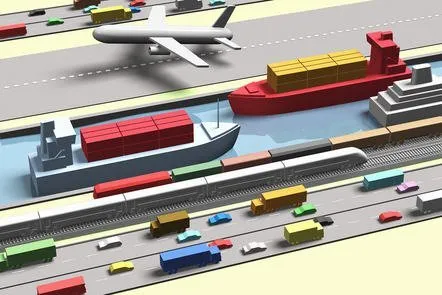
What is Economics in Global Logistics? 
This two-week course provides an introduction to economics and its role in global logistics. You will learn about micro and macroeconomic concepts, the long and short-run economic scenarios, transport's role in economic development, and how market structures influence transport markets. This course is ideal for business professionals looking to improve their logistics, supply chain, or distribution skills. ▼
ADVERTISEMENT
Course Feature
![]() Cost:
Cost:
Free
![]() Provider:
Provider:
Futurelearn
![]() Certificate:
Certificate:
Paid Certification
![]() Language:
Language:
English
![]() Start Date:
Start Date:
18th May, 2020
Course Overview
❗The content presented here is sourced directly from Futurelearn platform. For comprehensive course details, including enrollment information, simply click on the 'Go to class' link on our website.
Updated in [May 25th, 2023]
By the end of the course, participants will be able to:
- Define economics and explain the basic economic concepts
- Explain the difference between the long and short-run economic scenario in profit maximisation
- Investigate the role of transport in economic development and growth
- Investigate how economic market structures influence transport markets and affect efficiency using contestable theory
This course is designed to provide participants with the knowledge and skills to understand the economic principles that affect global logistics businesses. It will cover topics such as microeconomics, macroeconomics, transport economics, market structures, and pricing. Participants will gain an understanding of how economics affects the global logistics industry and how to use economic principles to make informed decisions.
The course will be delivered through a combination of lectures, discussions, and practical activities. Participants will be encouraged to actively participate in the activities and discussions to gain a better understanding of the topics.
At the end of the course, participants will be able to apply the economic principles they have learned to their own business and make informed decisions. They will also be able to identify and analyse the economic factors that affect the global logistics industry.
This course is ideal for business professionals who are looking to improve their logistics, supply chain, or distribution skills, especially in costing and pricing of logistics services.
[Applications]
Upon completion of this course, participants can apply their knowledge of economics to their global logistics business by understanding the economic environment in which their business operates, analysing the impact of economic policies on their business, and making informed decisions on pricing and cost management. Participants can also use their knowledge of economics to better understand the behaviour of their customers and competitors.
[Career Paths]
Job Position Paths:
1. Logistics Manager: Logistics Managers are responsible for overseeing the efficient flow of goods and services from point of origin to point of consumption. They are responsible for managing the supply chain, ensuring that goods are delivered on time and in the right quantity. They must also be able to identify and resolve any issues that arise in the supply chain. As the global economy continues to expand, the demand for Logistics Managers is expected to grow.
2. Supply Chain Analyst: Supply Chain Analysts are responsible for analyzing data related to the supply chain and making recommendations to improve efficiency and reduce costs. They must be able to identify trends and patterns in the data and use them to develop strategies for improving the supply chain. As the global economy continues to expand, the demand for Supply Chain Analysts is expected to grow.
3. Logistics Coordinator: Logistics Coordinators are responsible for coordinating the movement of goods and services from point of origin to point of consumption. They must be able to identify and resolve any issues that arise in the supply chain. As the global economy continues to expand, the demand for Logistics Coordinators is expected to grow.
4. Distribution Manager: Distribution Managers are responsible for overseeing the distribution of goods and services from point of origin to point of consumption. They must be able to identify and resolve any issues that arise in the supply chain. As the global economy continues to expand, the demand for Distribution Managers is expected to grow.
[Education Paths]
Recommended Degree Paths:
1. Bachelor of Science in Logistics and Supply Chain Management: This degree program provides students with the knowledge and skills necessary to manage the logistics and supply chain operations of a business. It covers topics such as inventory management, transportation, warehousing, and customer service. Students will also learn about the latest trends in the industry, such as the use of technology and automation.
2. Master of Science in Global Logistics and Supply Chain Management: This degree program provides students with the advanced knowledge and skills necessary to manage global logistics and supply chain operations. It covers topics such as international trade, customs regulations, and global sourcing. Students will also learn about the latest trends in the industry, such as the use of technology and automation.
3. Doctor of Philosophy in Logistics and Supply Chain Management: This degree program provides students with the highest level of knowledge and skills necessary to manage logistics and supply chain operations. It covers topics such as strategic planning, operations management, and supply chain optimization. Students will also learn about the latest trends in the industry, such as the use of technology and automation.
4. Master of Business Administration in Logistics and Supply Chain Management: This degree program provides students with the business knowledge and skills necessary to manage logistics and supply chain operations. It covers topics such as finance, marketing, and operations. Students will also learn about the latest trends in the industry, such as the use of technology and automation.
Course Provider

Provider Futurelearn's Stats at AZClass
Discussion and Reviews
0.0 (Based on 0 reviews)
Explore Similar Online Courses

Meditation for Beginners: How to Meditate Deeply & Quickly

How To Make an eCommerce Website With Wordpress 2018

Python for Informatics: Exploring Information

Social Network Analysis

Introduction to Systematic Review and Meta-Analysis

The Analytics Edge

DCO042 - Python For Informatics

Causal Diagrams: Draw Your Assumptions Before Your Conclusions

Whole genome sequencing of bacterial genomes - tools and applications

Simulation for Logistics: An Introduction

Sustainability and Green Logistics: An Introduction

Principles of Global Logistics Management
 Related Categories
Related Categories
 Popular Providers
Popular Providers
Quiz
 Submitted Sucessfully
Submitted Sucessfully
1. What is the main focus of this course?
2. What is the duration of this course?
3. What is the role of transport in economic development and growth?
4. What is the main purpose of this course?
Correct Answer: To provide an understanding of basic economic concepts and use them to explain the behaviour of a simplified economy.


Start your review of What is Economics in Global Logistics?